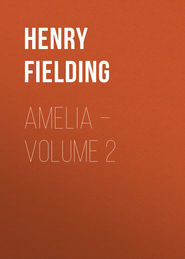По всем вопросам обращайтесь на: info@litportal.ru
(©) 2003-2024.
✖
Amelia – Complete
Настройки чтения
Размер шрифта
Высота строк
Поля
“Well, sir,” said Robinson, “I now am sure I can do his business; for I know he hath a silver cup in his possession which is the property of this gentleman (meaning Booth), and how he got it but by stealth let him account if he can.”
“That will do,” cries the justice with great pleasure. “That will do; and if you will charge him on oath with that, I will instantly grant my warrant to search his house for it.” “And I will go and see it executed,” cries the doctor; for it was a maxim of his, that no man could descend below himself in doing any act which may contribute to protect an innocent person, or to bring a rogue to the gallows.
The oath was instantly taken, the warrant signed, and the doctor attended the constable in the execution of it.
The clerk then proceeded in taking the information of Robinson, and had just finished it, when the doctor returned with the utmost joy in his countenance, and declared that he had sufficient evidence of the fact in his possession. He had, indeed, two or three letters from Miss Harris in answer to the attorney’s frequent demands of money for secrecy, that fully explained the whole villany.
The justice now asked the prisoner what he had to say for himself, or whether he chose to say anything in his own defence.
“Sir,” said the attorney, with great confidence, “I am not to defend myself here. It will be of no service to me; for I know you neither can nor will discharge me. But I am extremely innocent of all this matter, as I doubt not but to make appear to the satisfaction of a court of justice.”
The legal previous ceremonies were then gone through of binding over the prosecutor, &c., and then the attorney was committed to Newgate, whither he was escorted amidst the acclamations of the populace.
When Murphy was departed, and a little calm restored in the house, the justice made his compliments of congratulation to Booth, who, as well as he could in his present tumult of joy, returned his thanks to both the magistrate and the doctor. They were now all preparing to depart, when Mr. Bondum stept up to Booth, and said, “Hold, sir, you have forgot one thing – you have not given bail yet.”
This occasioned some distress at this time, for the attorney’s friend was departed; but when the justice heard this, he immediately offered himself as the other bondsman, and thus ended the affair.
It was now past six o’clock, and none of the gentlemen had yet dined. They very readily, therefore, accepted the magistrate’s invitation, and went all together to his house.
And now the very first thing that was done, even before they sat down to dinner, was to dispatch a messenger to one of the best surgeons in town to take care of Robinson, and another messenger to Booth’s lodgings to prevent Amelia’s concern at their staying so long.
The latter, however, was to little purpose; for Amelia’s patience had been worn out before, and she had taken a hackney-coach and driven to the bailiff’s, where she arrived a little after the departure of her husband, and was thence directed to the justice’s.
Though there was no kind of reason for Amelia’s fright at hearing that her husband and Doctor Harrison were gone before the justice, and though she indeed imagined that they were there in the light of complainants, not of offenders, yet so tender were her fears for her husband, and so much had her gentle spirits been lately agitated, that she had a thousand apprehensions of she knew not what. When she arrived, therefore, at the house, she ran directly into the room where all the company were at dinner, scarce knowing what she did or whither she was going.
She found her husband in such a situation, and discovered such chearfulness in his countenance, that so violent a turn was given to her spirits that she was just able, with the assistance of a glass of water, to support herself. She soon, however, recovered her calmness, and in a little time began to eat what might indeed be almost called her breakfast.
The justice now wished her joy of what had happened that day, for which she kindly thanked him, apprehending he meant the liberty of her husband. His worship might perhaps have explained himself more largely had not the doctor given him a timely wink; for this wise and good man was fearful of making such a discovery all at once to Amelia, lest it should overpower her, and luckily the justice’s wife was not well enough acquainted with the matter to say anything more on it than barely to assure the lady that she joined in her husband’s congratulation.
Amelia was then in a clean white gown, which she had that day redeemed, and was, indeed, dressed all over with great neatness and exactness; with the glow therefore which arose in her features from finding her husband released from his captivity, she made so charming a figure, that she attracted the eyes of the magistrate and of his wife, and they both agreed when they were alone that they had never seen so charming a creature; nay, Booth himself afterwards told her that he scarce ever remembered her to look so extremely beautiful as she did that evening.
Whether Amelia’s beauty, or the reflexion on the remarkable act of justice he had performed, or whatever motive filled the magistrate with extraordinary good humour, and opened his heart and cellars, I will not determine; but he gave them so hearty a welcome, and they were all so pleased with each other, that Amelia, for that one night, trusted the care of her children to the woman where they lodged, nor did the company rise from table till the clock struck eleven.
They then separated. Amelia and Booth, having been set down at their lodgings, retired into each other’s arms; nor did Booth that evening, by the doctor’s advice, mention one word of the grand affair to his wife.
Chapter viii. – Thus this history draws nearer to a conclusion
In the morning early Amelia received the following letter from Mrs. Atkinson:
“The surgeon of the regiment, to which the captain my husband lately belonged, and who came this evening to see the captain, hath almost frightened me out of my wits by a strange story of your husband being committed to prison by a justice of peace for forgery. For Heaven’s sake send me the truth. If my husband can be of any service, weak as he is, he will be carried in a chair to serve a brother officer for whom he hath a regard, which I need not mention. Or if the sum of twenty pound will be of any service to you, I will wait upon you with it the moment I can get my cloaths on, the morning you receive this; for it is too late to send to-night. The captain begs his hearty service and respects, and believe me,
“Dear Madam,
Your ever affectionate friend, and humble servant,
F. ATKINSON.”
When Amelia read this letter to Booth they were both equally surprized, she at the commitment for forgery, and he at seeing such a letter from Mrs. Atkinson; for he was a stranger yet to the reconciliation that had happened.
Booth’s doubts were first satisfied by Amelia, from which he received great pleasure; for he really had a very great affection and fondness for Mr. Atkinson, who, indeed, so well deserved it. “Well, my dear,” said he to Amelia, smiling, “shall we accept this generous offer?”
“O fy! no, certainly,” answered she.
“Why not?” cries Booth; “it is but a trifle; and yet it will be of great service to us.”
“But consider, my dear,” said she, “how ill these poor people can spare it.”
“They can spare it for a little while,” said Booth, “and we shall soon pay it them again.”
“When, my dear?” said Amelia. “Do, my dear Will, consider our wretched circumstances. I beg you let us go into the country immediately, and live upon bread and water till Fortune pleases to smile upon us.”
“I am convinced that day is not far off,” said Booth. “However, give me leave to send an answer to Mrs. Atkinson, that we shall be glad of her company immediately to breakfast.”
“You know I never contradict you,” said she, “but I assure you it is contrary to my inclinations to take this money.”
“Well, suffer me,” cries he, “to act this once contrary to your inclinations.” He then writ a short note to Mrs. Atkinson, and dispatched it away immediately; which when he had done, Amelia said, “I shall be glad of Mrs. Atkinson’s company to breakfast; but yet I wish you would oblige me in refusing this money. Take five guineas only. That is indeed such a sum as, if we never should pay it, would sit light on my mind. The last persons in the world from whom I would receive favours of that sort are the poor and generous.”
“You can receive favours only from the generous,” cries Booth; “and, to be plain with you, there are very few who are generous that are not poor.”
“What think you,” said she, “of Dr Harrison?”
“I do assure you,” said Booth, “he is far from being rich. The doctor hath an income of little more than six hundred pound a-year, and I am convinced he gives away four of it. Indeed, he is one of the best economists in the world: but yet I am positive he never was at any time possessed of five hundred pound, since he hath been a man. Consider, dear Emily, the late obligations we have to this gentleman; it would be unreasonable to expect more, at least at present; my half-pay is mortgaged for a year to come. How then shall we live?”
“By our labour,” answered she; “I am able to labour, and I am sure I am not ashamed of it.”
“And do you really think you can support such a life?”
“I am sure I could be happy in it,” answered Amelia. “And why not I as well as a thousand others, who have not the happiness of such a husband to make life delicious? why should I complain of my hard fate while so many who are much poorer than I enjoy theirs? Am I of a superior rank of being to the wife of the honest labourer? am I not partaker of one common nature with her?”
“My angel,” cries Booth, “it delights me to hear you talk thus, and for a reason you little guess; for I am assured that one who can so heroically endure adversity, will bear prosperity with equal greatness of soul; for the mind that cannot be dejected by the former, is not likely to be transported with the latter.”
“If it had pleased Heaven,” cried she, “to have tried me, I think, at least I hope, I should have preserved my humility.”
“Then, my dear,” said he, “I will relate you a dream I had last night. You know you lately mentioned a dream of yours.”
“Do so,” said she; “I am attentive.”
“I dreamt,” said he, “this night, that we were in the most miserable situation imaginable; indeed, in the situation we were yesterday morning, or rather worse; that I was laid in a prison for debt, and that you wanted a morsel of bread to feed the mouths of your hungry children. At length (for nothing you know is quicker than the transition in dreams) Dr Harrison methought came to me, with chearfulness and joy in his countenance. The prison-doors immediately flew open, and Dr Harrison introduced you, gayly though not richly dressed. That you gently chid me for staying so long. All on a sudden appeared a coach with four horses to it, in which was a maid-servant with our two children. We both immediately went into the coach, and, taking our leave of the doctor, set out towards your country-house; for yours I dreamt it was. I only ask you now, if this was real, and the transition almost as sudden, could you support it?”
Amelia was going to answer, when Mrs. Atkinson came into the room, and after very little previous ceremony, presented Booth with a bank-note, which he received of her, saying he would very soon repay it; a promise that a little offended Amelia, as she thought he had no chance of keeping it.
The doctor presently arrived, and the company sat down to breakfast, during which Mrs. Atkinson entertained them with the history of the doctors that had attended her husband, by whose advice Atkinson was recovered from everything but the weakness which his distemper had occasioned.
When the tea-table was removed Booth told the doctor that he had acquainted his wife with a dream he had last night. “I dreamt, doctor,” said he, “that she was restored to her estate.”
“Very well,” said the doctor; “and if I am to be the Oneiropolus, I believe the dream will come to pass. To say the truth, I have rather a better opinion of dreams than Horace had. Old Homer says they come from Jupiter; and as to your dream, I have often had it in my waking thoughts, that some time or other that roguery (for so I was always convinced it was) would be brought to light; for the same Homer says, as you, madam (meaning Mrs. Atkinson), very well know,[20 - “If Jupiter doth not immediately execute his vengeance, he will however execute it at last; and their transgressions shall fall heavily on their own heads, and on their wives and children."]
{Greek verses}
“That will do,” cries the justice with great pleasure. “That will do; and if you will charge him on oath with that, I will instantly grant my warrant to search his house for it.” “And I will go and see it executed,” cries the doctor; for it was a maxim of his, that no man could descend below himself in doing any act which may contribute to protect an innocent person, or to bring a rogue to the gallows.
The oath was instantly taken, the warrant signed, and the doctor attended the constable in the execution of it.
The clerk then proceeded in taking the information of Robinson, and had just finished it, when the doctor returned with the utmost joy in his countenance, and declared that he had sufficient evidence of the fact in his possession. He had, indeed, two or three letters from Miss Harris in answer to the attorney’s frequent demands of money for secrecy, that fully explained the whole villany.
The justice now asked the prisoner what he had to say for himself, or whether he chose to say anything in his own defence.
“Sir,” said the attorney, with great confidence, “I am not to defend myself here. It will be of no service to me; for I know you neither can nor will discharge me. But I am extremely innocent of all this matter, as I doubt not but to make appear to the satisfaction of a court of justice.”
The legal previous ceremonies were then gone through of binding over the prosecutor, &c., and then the attorney was committed to Newgate, whither he was escorted amidst the acclamations of the populace.
When Murphy was departed, and a little calm restored in the house, the justice made his compliments of congratulation to Booth, who, as well as he could in his present tumult of joy, returned his thanks to both the magistrate and the doctor. They were now all preparing to depart, when Mr. Bondum stept up to Booth, and said, “Hold, sir, you have forgot one thing – you have not given bail yet.”
This occasioned some distress at this time, for the attorney’s friend was departed; but when the justice heard this, he immediately offered himself as the other bondsman, and thus ended the affair.
It was now past six o’clock, and none of the gentlemen had yet dined. They very readily, therefore, accepted the magistrate’s invitation, and went all together to his house.
And now the very first thing that was done, even before they sat down to dinner, was to dispatch a messenger to one of the best surgeons in town to take care of Robinson, and another messenger to Booth’s lodgings to prevent Amelia’s concern at their staying so long.
The latter, however, was to little purpose; for Amelia’s patience had been worn out before, and she had taken a hackney-coach and driven to the bailiff’s, where she arrived a little after the departure of her husband, and was thence directed to the justice’s.
Though there was no kind of reason for Amelia’s fright at hearing that her husband and Doctor Harrison were gone before the justice, and though she indeed imagined that they were there in the light of complainants, not of offenders, yet so tender were her fears for her husband, and so much had her gentle spirits been lately agitated, that she had a thousand apprehensions of she knew not what. When she arrived, therefore, at the house, she ran directly into the room where all the company were at dinner, scarce knowing what she did or whither she was going.
She found her husband in such a situation, and discovered such chearfulness in his countenance, that so violent a turn was given to her spirits that she was just able, with the assistance of a glass of water, to support herself. She soon, however, recovered her calmness, and in a little time began to eat what might indeed be almost called her breakfast.
The justice now wished her joy of what had happened that day, for which she kindly thanked him, apprehending he meant the liberty of her husband. His worship might perhaps have explained himself more largely had not the doctor given him a timely wink; for this wise and good man was fearful of making such a discovery all at once to Amelia, lest it should overpower her, and luckily the justice’s wife was not well enough acquainted with the matter to say anything more on it than barely to assure the lady that she joined in her husband’s congratulation.
Amelia was then in a clean white gown, which she had that day redeemed, and was, indeed, dressed all over with great neatness and exactness; with the glow therefore which arose in her features from finding her husband released from his captivity, she made so charming a figure, that she attracted the eyes of the magistrate and of his wife, and they both agreed when they were alone that they had never seen so charming a creature; nay, Booth himself afterwards told her that he scarce ever remembered her to look so extremely beautiful as she did that evening.
Whether Amelia’s beauty, or the reflexion on the remarkable act of justice he had performed, or whatever motive filled the magistrate with extraordinary good humour, and opened his heart and cellars, I will not determine; but he gave them so hearty a welcome, and they were all so pleased with each other, that Amelia, for that one night, trusted the care of her children to the woman where they lodged, nor did the company rise from table till the clock struck eleven.
They then separated. Amelia and Booth, having been set down at their lodgings, retired into each other’s arms; nor did Booth that evening, by the doctor’s advice, mention one word of the grand affair to his wife.
Chapter viii. – Thus this history draws nearer to a conclusion
In the morning early Amelia received the following letter from Mrs. Atkinson:
“The surgeon of the regiment, to which the captain my husband lately belonged, and who came this evening to see the captain, hath almost frightened me out of my wits by a strange story of your husband being committed to prison by a justice of peace for forgery. For Heaven’s sake send me the truth. If my husband can be of any service, weak as he is, he will be carried in a chair to serve a brother officer for whom he hath a regard, which I need not mention. Or if the sum of twenty pound will be of any service to you, I will wait upon you with it the moment I can get my cloaths on, the morning you receive this; for it is too late to send to-night. The captain begs his hearty service and respects, and believe me,
“Dear Madam,
Your ever affectionate friend, and humble servant,
F. ATKINSON.”
When Amelia read this letter to Booth they were both equally surprized, she at the commitment for forgery, and he at seeing such a letter from Mrs. Atkinson; for he was a stranger yet to the reconciliation that had happened.
Booth’s doubts were first satisfied by Amelia, from which he received great pleasure; for he really had a very great affection and fondness for Mr. Atkinson, who, indeed, so well deserved it. “Well, my dear,” said he to Amelia, smiling, “shall we accept this generous offer?”
“O fy! no, certainly,” answered she.
“Why not?” cries Booth; “it is but a trifle; and yet it will be of great service to us.”
“But consider, my dear,” said she, “how ill these poor people can spare it.”
“They can spare it for a little while,” said Booth, “and we shall soon pay it them again.”
“When, my dear?” said Amelia. “Do, my dear Will, consider our wretched circumstances. I beg you let us go into the country immediately, and live upon bread and water till Fortune pleases to smile upon us.”
“I am convinced that day is not far off,” said Booth. “However, give me leave to send an answer to Mrs. Atkinson, that we shall be glad of her company immediately to breakfast.”
“You know I never contradict you,” said she, “but I assure you it is contrary to my inclinations to take this money.”
“Well, suffer me,” cries he, “to act this once contrary to your inclinations.” He then writ a short note to Mrs. Atkinson, and dispatched it away immediately; which when he had done, Amelia said, “I shall be glad of Mrs. Atkinson’s company to breakfast; but yet I wish you would oblige me in refusing this money. Take five guineas only. That is indeed such a sum as, if we never should pay it, would sit light on my mind. The last persons in the world from whom I would receive favours of that sort are the poor and generous.”
“You can receive favours only from the generous,” cries Booth; “and, to be plain with you, there are very few who are generous that are not poor.”
“What think you,” said she, “of Dr Harrison?”
“I do assure you,” said Booth, “he is far from being rich. The doctor hath an income of little more than six hundred pound a-year, and I am convinced he gives away four of it. Indeed, he is one of the best economists in the world: but yet I am positive he never was at any time possessed of five hundred pound, since he hath been a man. Consider, dear Emily, the late obligations we have to this gentleman; it would be unreasonable to expect more, at least at present; my half-pay is mortgaged for a year to come. How then shall we live?”
“By our labour,” answered she; “I am able to labour, and I am sure I am not ashamed of it.”
“And do you really think you can support such a life?”
“I am sure I could be happy in it,” answered Amelia. “And why not I as well as a thousand others, who have not the happiness of such a husband to make life delicious? why should I complain of my hard fate while so many who are much poorer than I enjoy theirs? Am I of a superior rank of being to the wife of the honest labourer? am I not partaker of one common nature with her?”
“My angel,” cries Booth, “it delights me to hear you talk thus, and for a reason you little guess; for I am assured that one who can so heroically endure adversity, will bear prosperity with equal greatness of soul; for the mind that cannot be dejected by the former, is not likely to be transported with the latter.”
“If it had pleased Heaven,” cried she, “to have tried me, I think, at least I hope, I should have preserved my humility.”
“Then, my dear,” said he, “I will relate you a dream I had last night. You know you lately mentioned a dream of yours.”
“Do so,” said she; “I am attentive.”
“I dreamt,” said he, “this night, that we were in the most miserable situation imaginable; indeed, in the situation we were yesterday morning, or rather worse; that I was laid in a prison for debt, and that you wanted a morsel of bread to feed the mouths of your hungry children. At length (for nothing you know is quicker than the transition in dreams) Dr Harrison methought came to me, with chearfulness and joy in his countenance. The prison-doors immediately flew open, and Dr Harrison introduced you, gayly though not richly dressed. That you gently chid me for staying so long. All on a sudden appeared a coach with four horses to it, in which was a maid-servant with our two children. We both immediately went into the coach, and, taking our leave of the doctor, set out towards your country-house; for yours I dreamt it was. I only ask you now, if this was real, and the transition almost as sudden, could you support it?”
Amelia was going to answer, when Mrs. Atkinson came into the room, and after very little previous ceremony, presented Booth with a bank-note, which he received of her, saying he would very soon repay it; a promise that a little offended Amelia, as she thought he had no chance of keeping it.
The doctor presently arrived, and the company sat down to breakfast, during which Mrs. Atkinson entertained them with the history of the doctors that had attended her husband, by whose advice Atkinson was recovered from everything but the weakness which his distemper had occasioned.
When the tea-table was removed Booth told the doctor that he had acquainted his wife with a dream he had last night. “I dreamt, doctor,” said he, “that she was restored to her estate.”
“Very well,” said the doctor; “and if I am to be the Oneiropolus, I believe the dream will come to pass. To say the truth, I have rather a better opinion of dreams than Horace had. Old Homer says they come from Jupiter; and as to your dream, I have often had it in my waking thoughts, that some time or other that roguery (for so I was always convinced it was) would be brought to light; for the same Homer says, as you, madam (meaning Mrs. Atkinson), very well know,[20 - “If Jupiter doth not immediately execute his vengeance, he will however execute it at last; and their transgressions shall fall heavily on their own heads, and on their wives and children."]
{Greek verses}












